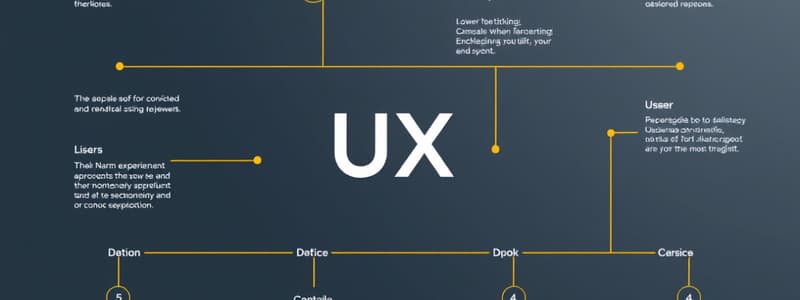Podcast
Questions and Answers
What is the primary focus of the define stage in the UX design process?
What is the primary focus of the define stage in the UX design process?
- Creating user personas and stories
- Understanding the product's purpose, target audience, and business goals (correct)
- Gathering insights about users and their needs
- Testing the prototype with real users
Which method is not typically used in the research phase of the UX design process?
Which method is not typically used in the research phase of the UX design process?
- Surveys
- Interviews
- Usability testing
- Coding the product (correct)
What do designers create during the analysis & planning stage?
What do designers create during the analysis & planning stage?
- User personas and user stories (correct)
- High-fidelity prototypes
- Deployment plans
- The final product code
What is the main purpose of the prototyping stage in the UX design process?
What is the main purpose of the prototyping stage in the UX design process?
Which of the following best describes the iteration stage after deployment?
Which of the following best describes the iteration stage after deployment?
Flashcards are hidden until you start studying
Study Notes
UX Design Process Overview
- Involves a series of steps aimed at creating user-centered experiences.
- Each step builds on the previous one, ensuring a thorough and coherent design approach.
Step 1: Define
- Focuses on understanding the 'why' and 'who' behind the product.
- Identification of the product's purpose, target audience, and business goals is crucial.
- Involves stakeholder meetings to establish a clear direction.
Step 2: Research
- Gathers insights about users and their needs through various methods.
- User research aims to understand behaviors and preferences while market research analyzes industry trends and competitors.
- Techniques such as interviews, surveys, and usability testing yield valuable data.
Step 3: Analysis & Planning
- Designers plan product development based on research findings.
- Creation of user personas represents target users.
- User stories describe interactions; wireframes outline basic layouts.
- A project roadmap guides the overall development process.
Step 4: Design
- Actual user interface (UI) creation takes place in this stage.
- Key considerations include information architecture, navigation, layout, usability, accessibility, and microcopy.
- Transition from low-fidelity wireframes to high-fidelity designs includes color schemes, typography, and iconography.
Step 5: Prototyping
- Involves building interactive mockups of the product for testing purposes.
- Allows designers to evaluate the user interface and gather feedback before full development.
- Prototypes vary from low-fidelity (simple sketches) to high-fidelity (detailed simulations).
Step 6: Testing
- Real users test the prototype to gather feedback on usability and effectiveness.
- Insights gained from testing inform design refinements and improve user experience.
Step 7: Development
- The finalized design is translated into an actual product using selected technologies.
- Developers create the product based on specific design specifications.
Step 8: Deployment & Iteration
- The final product is launched for users to access.
- The design process remains continuous, involving monitoring of user behavior, gathering feedback, and making iterative improvements to usability and effectiveness.
Studying That Suits You
Use AI to generate personalized quizzes and flashcards to suit your learning preferences.




